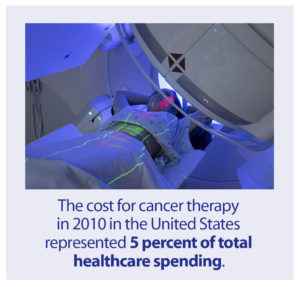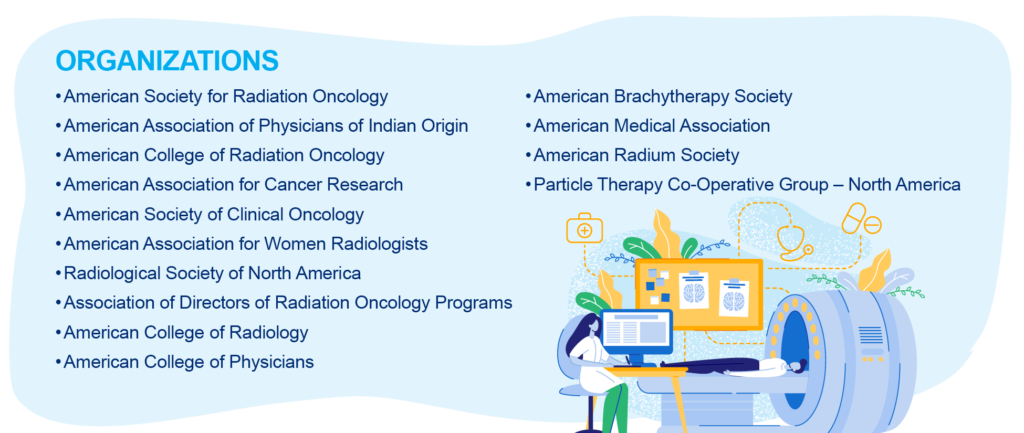Evaluation of the
Radiation Oncology
(RO) Model
The RO Model aims to improve the quality of care for cancer patients receiving radiotherapy and move toward a simplified and predictable payment system.
About Econometrica
Econometrica, Inc., has a long-standing record of providing high-quality, cost-effective evaluation services, maximizing our talents and connections to produce meaningful results.
We are an organization dedicated to engaging in projects that promote intellectual curiosity and large-scale problem-solving with profound experience in all aspects of program evaluation, including developing evaluation designs; engaging in data collection, acquisition, and analysis; and communicating evaluation findings.
Why Our Team
Our strength in execution of program evaluations is derived from our ability to accurately assess the impact of payment models. Econometrica’s success lies in a constellation of key factors:
Our History
A history of successfully performing meaningful evaluations for the Centers for Medicare & Medicaid  Services (CMS), including our evaluations of the Bundled Payments for Care Improvement (BPCI) Initiative, the Community-based Care Transitions Program (CCTP), and the Partnership for Patients (PfP). This work demonstrates our ability to enact innovative evaluation designs, execute evaluation design plans with high fidelity, and support CMS in effectively reporting findings to key stakeholders (e.g., Congress).
Services (CMS), including our evaluations of the Bundled Payments for Care Improvement (BPCI) Initiative, the Community-based Care Transitions Program (CCTP), and the Partnership for Patients (PfP). This work demonstrates our ability to enact innovative evaluation designs, execute evaluation design plans with high fidelity, and support CMS in effectively reporting findings to key stakeholders (e.g., Congress).
Proficiency in Partnering
We partner with the right experts in the field to inform the work. Bringing in the provider’s point of view ![]() enables us to create an evaluation design that accounts for the complex nuances of care.
enables us to create an evaluation design that accounts for the complex nuances of care.
Extensive Knowledge
Econometrica’s extensive knowledge base and experience using Medicare claims and other types of data for![]() evaluation and research purposes.
evaluation and research purposes.
Building on this foundation, the Econometrica Team is ready to engage in the evaluative work of the RO Model.
Background and Understanding
In 2017, the U.S. Department of Health & Human Services (HHS) submitted a report to Congress outlining the cost, utilization, and quality of cancer treatment with radiation therapy (RT), leading to development of an episodic RT Alternative Payment Model. The National Cancer Institute and the American Cancer Society estimated in this report that there would be 1,688,780 new cancer cases and 600,920 cancer deaths in 2017;[1] it further indicated that in 2010, the cost for cancer therapy in the United States represented 5 percent of total healthcare spending. Since then, costs associated with cancer therapy have continued to rise and are projected to top $245 billion annually by 2030.[2]
 The services included in RT payments include consultations, treatment planning, technical preparation and special services, treatment delivery, and post-treatment consultations. These services can be provided by Hospital Outpatient Departments (HOPDs) and/or within freestanding RT centers. Primarily these services are paid under the Outpatient Prospective Payment System (OPPS) and/or through Medicare Part B under the Medicare Physician Fee Schedule (PFS). As outlined in the 2017 report, there are complexities associated with the current payment systems with regards to RT; CMS has few means to validate the accuracy of the submitted claims. It also noted that since CMS typically pays for radiation services separately and on a per-service basis (in both the PFS and OPPS), a clinician or hospital department submits more or fewer claims to Medicare based on the number of radiation services furnished. The report also indicated how differences in methodologies used in OPPS and PFS for rate setting resulted in site-of-service payment differentials. In addition to these payment methodology changes, participants are required to submit quality measure data, engage with a patient safety organization approved by the Agency for Healthcare Research and Quality, and engage in peer review of treatment plans, such as the Extreme and Uncontrollable Circumstances Due to COVID-19 application. These model components are optional in 2022.
The services included in RT payments include consultations, treatment planning, technical preparation and special services, treatment delivery, and post-treatment consultations. These services can be provided by Hospital Outpatient Departments (HOPDs) and/or within freestanding RT centers. Primarily these services are paid under the Outpatient Prospective Payment System (OPPS) and/or through Medicare Part B under the Medicare Physician Fee Schedule (PFS). As outlined in the 2017 report, there are complexities associated with the current payment systems with regards to RT; CMS has few means to validate the accuracy of the submitted claims. It also noted that since CMS typically pays for radiation services separately and on a per-service basis (in both the PFS and OPPS), a clinician or hospital department submits more or fewer claims to Medicare based on the number of radiation services furnished. The report also indicated how differences in methodologies used in OPPS and PFS for rate setting resulted in site-of-service payment differentials. In addition to these payment methodology changes, participants are required to submit quality measure data, engage with a patient safety organization approved by the Agency for Healthcare Research and Quality, and engage in peer review of treatment plans, such as the Extreme and Uncontrollable Circumstances Due to COVID-19 application. These model components are optional in 2022.
The report describes how a few different episodic alternative payment models are being tested to determine whether episodic payments reduce program expenditures while enhancing beneficiaries’ quality of care. Seven key episodic alternative payment model design elements are described, with the final component being evaluation.
[1] U.S. Department of Health & Human Services. (2017, November). Report to Congress: Episodic alternative payment model for radiation therapy services. https://innovation.cms.gov/files/reports/radiationtherapy-apm-rtc.pdf.
[2] Mariotto, A. B., Zhang, F., Buckman, D. W., Miller, D., Cho, H., & Feuer, E. J. (2021). Characterizing Trends in Cancer Patients’ Survival Using the JPSurv Software. Cancer Epidemiology Biomarkers & Prevention, 30(11), 2001–2009. https://doi.org/10.1158/1055-9965.epi-21-0423.
The Econometrica Team Collaboration
Hallmark to Econometrica’s approach in program evaluation is collaboration with subject matter experts (SMEs), utilizing clinical contexts to inform our approach. We are partnering with 10 leading radiation and clinical oncologists throughout the country to supplement our knowledge of the RO Model implementation from a provider perspective. Our 10 radiation oncology subject matter experts (RO-SMEs) will offer clinical perspectives, but will remain blind to evaluation of cost or payment impacts of the model. The expertise provided by our RO-SME team falls under a multitude of areas, including direct work in radiation oncology, experience working with the National Cancer Institute’s Surveillance, Epidemiology, and End Results (SEER) database, SEER–Medicare Linked Database, and the Agency for Healthcare Research and Quality’s Consumer Assessment of Healthcare Providers and Systems (CAHPS®) for Cancer Care data. These physicians have specializations in the treatment of genitourinary cancers (including prostate cancer), breast cancer, bone cancers, head and neck cancers, lung cancers, gastrointestinal cancers, melanoma/skin cancers, brain tumors, sarcoma, and lymphoma. They have experience in using a number of RT modalities, including but not limited to stereotactic radiosurgery, stereotactic body radiotherapy, low and high dose-rate brachytherapy, intensity modulated radiotherapy, 3D conformal, electron, and orthovoltage therapy. Our distinguished RO-SMEs have published more than 450 articles in prestigious medical and oncology journals, including JAMA Oncology.
Many of our RO-SMEs have served in chair and director positions at their hospitals or facilities and/or as clinical faculty in schools of medicine across the country. They are board-certified and represent membership in the organizations such as those below.
The partnership between RO-SMEs and evaluators will strengthen the Econometrica Team’s approach to the RO Model evaluation. As leaders in RO field, our RO-SMEs will provide vital and distinctive clinical perspective to the RO Model evaluation, providing context and a practical understanding of the data that will help evaluators produce meaningful results. We have found success in the past in establishing these types of strong relationships; for our evaluation of the BPCI Advanced Model, Econometrica researched quality measure specifications and made recommendations for operationalizing measures. This project included collaborating with SMEs within specialty societies to select measures that would be more reflective of high-quality care for each of the 34 specific clinical episodes, which will be similar to the process we will take with our RO-SMEs during the RO Model evaluation work.

Overview of the Econometrica Team’s Evaluation Performance
As a leader in executing program evaluations, Econometrica has a foundational understanding of how payment models can impact provider services based on years of experience in data analysis and program evaluation. Each evaluation provided unique challenges that we addressed through innovative designs. One example that highlights our excellence in program evaluation execution includes our work with CMS on the evaluation and monitoring of BPCI Model 1. By employing a variety of qualitative, econometric, and statistical techniques to assess changes in service utilization patterns, patient case mix, incidence of harm, quality of care, changes in key health outcomes of patients and changes in Medicare expenditures, we provided CMS with contextualized findings and rapid-cycle information on participant activities and model status.
Econometrica has conducted numerous program evaluations, producing the findings and outcomes that are most meaningful to CMS and other government agencies. As Econometrica has engaged in evaluative design and associated research, our approaches have evolved. We will apply our refined methods to the RO Model to produce better outcomes and enhance CMS’ understandings.
We list other examples of our past evaluation experience in the blue box.
Our work on the CCTP evaluation assessed the impact of the program on readmissions, emergency department visits, observation services, quality of care, costs, and patient activation using a strong mixed-methods design. In applying our lessons learned from our work on BPCI, we utilized three quantitative analytic approaches: (1) a pre-post regression model, (2) a difference-in-differences regression model, and (3) a time series model, allowing us to estimate effects of the CCTP.
Econometrica’s most significant innovative evaluation approach was taken with the PfP 1.0 and 2.0 Evaluation & Measurement contracts, where our talents in mixed-methods evaluation design resulted in the development of a new econometric model technique. Our pioneering technique, called the Bayesian Attribution Model (BAM), allowed our team to accurately attribute the proportion of improvement in Medicare beneficiary health outcomes directly to PfP activities, effectively separating the spillover effects from simultaneously running models. Through our evaluation, we found that the PfP 1.0 and 2.0 resulted in a significant cost savings of $571 million and $124 million, respectively, while other less-sophisticated methods were unable to tie observed changes in cost directly to the PfP initiative. Econometrica’s innovative BAM allowed for us to attribute the actual cost-savings impact to the PfP because we could detect spillover results not detectable in other evaluative approaches.
Our work on the Programs for All-Inclusive Care for the Elderly, the evaluation of the Physician Quality Reporting System (PQRS) and Electronic Prescribing Incentive Program, and the CCTP utilized our skilled approach to collecting primary data from Medicare beneficiaries, individuals dually eligible for Medicare and Medicaid, providers, and model participants, and using those data to inform and interpret our qualitative analyses and development of outcome measures.
The Econometrica Team’s Solution
Utilizing our extensive past experience, the Econometrica Team has identified the best approaches and means for program evaluation, continually refining our methods to deliver the most meaningful results. Quality assurance and the application of agile work processes have also produced compelling practices that add value and can benefit this work. Together, these skills and experiences have prepared our team to engage in further study to examine the methods and processes that are central to CMS work.
Specifically, our team is ready to conduct this RO Model evaluation. We intend to start by clearly identifying and laying out our plan for the work during a kickoff meeting, which will cover the submission of work, facilitation of meetings, and delivery of reports consistent with the task requirements. In consultation with the RO-SMEs, the RO Model Implementation Contractor (i.e., Mathematica), and other key CMS staff and agencies, we will also develop an Evaluation Design Report that will comprehensively detail the evaluation work. The development of a robust mixed-methods design will be driven by that collaboration, as key understandings from the RO field will be woven into the fabric of the research.
Our design looks to address the most essential research questions by comparing RO Model participants to providers who do not participate in the model. These research questions involve utilization patterns, Medicare spending, patient experiences of care, quality of life, access to RT care, and other changes. Equal weight will be placed on both the quantitative and qualitative aspects, offering a true mixed-methods evaluation of the RO Model. Econometrica’s plan will include a variety of data collection methods for primary and secondary data. With regard to secondary data collection, we will be responsible for obtaining and reviewing Medicare claims data (via the Chronic Conditions Data Warehouse), Cancer CAHPS® Survey data, SEER cancer registry data, SEER Medicare linked data, and other secondary data.
Based on our analysis of these secondary data sources, Econometrica proposes to conduct primary data collection activities (e.g., interviews, site visits, PGP/HOPD surveys, CAHPS® beneficiary surveys) to fully address each research question. This primary data collection will be driven by a consultative and iterative processes and informed by survey methodologists, statisticians, social scientists, and our RO-SMEs.
In subsequent engagement with our SMEs through routine working sessions, the Econometrica Team will further refine our approach, developing elegant and effective solutions of study to subsequent questions and queries. Essential to that work will be our exploration of critical outcome measures to assess and understand barriers and facilitators to the RO Model’s success. Through our regular collaboration with SMEs, we understand that concerns exist around, for example, service utilization, cost exchanges in other healthcare systems (e.g., related increased emergency development visits and hospital admissions), impact on small and rural practices, palliative care, lack of payment for RT for additional cancer sites, and overall provider burden. We also realize that facilitators of model success lie firmly in understanding the provider and patient experience. Based on these and other perspectives gleaned from our research, the Econometrica Team will refine our approach and provide CMS with frequent updates, with the goals of ensuring that our vision is in line with CMS and keeping everyone up to speed on the work and progress. Evaluation reports will tell the story of our work and evaluation progress in succinct, yet meaningful ways.
The dissemination of our findings is the final component of our plan. The Econometrica Team understands that information must be shared in an effective and efficient manner to have a real and lasting impact. We are highly skilled in developing high-quality informative material in various modalities designed for targeted or broader audiences. The strategies we have used to disseminate information in the past have been highly valued by CMS, and our team is ready to commence with this work.
Key Personnel

Monique Sheppard - Ph.D., M.S.
Project Director
Relevant Qualifications and Experience/Project Duties
Dr. Sheppard is a Project Director with more than 28 years of experience in working with Federal clients to conduct program evaluation and perform data collection and analysis. In her tenure at Econometrica, she has served as the Project Director on the following CMS Evaluations: PfP 2.0, CCTP, BPCI Model 1, Physician Quality Reporting System, and subcontractor Director for CMS’ Beneficiary and Family Centered Care National Coordinating Oversight and Review Center Evaluation.
As Project Director, Dr. Sheppard will support technical work, provide strategic direction to the entire team, and oversee project management and planning. Dr. Sheppard will lead the compilation of our mixed methods Evaluation Design Report and Evaluation Report Writing.

Imelda Flores Vazquez - Ph.D., M.A.
Relevant Qualifications and Experience/Project Duties
Dr. Flores Vazquez brings 8 years of experience in quantitative and mixed-methods data analysis, statistical methodologies, and program evaluation. She has advanced experience in using DiD analysis and Bayesian methodology to develop and lead large-scale evaluations and is a published author of program evaluation studies using causal inference methods including a DiD and regression discontinuity study published in The New England Journal of Medicine. She currently works on CMS’ Open Payments Program Analytics contract and is experienced in leading data analysis processes for large federal data sets and running customized queries through SAS. In addition to her analytical skillset, she has conducted research in healthcare disparities including those experienced by Medicare beneficiaries receiving end of life chemotherapy treatments.
Dr. Flores Vazquez will lead the Quantitative Data Team executing the evaluation design. She will oversee all quantitative data methodology, analysis, and reporting conducted by the quantitative data team. Additionally, she will coordinate with the Qualitative Task Lead (Dr. McNealy) to develop a mixed-methods approach for the evaluation design.

Kristie McNealy - M.D., PMP, CPHQ
Qualitative Task Lead
Relevant Qualifications and Experience/Project Duties
Dr. McNealy is a healthcare researcher bringing 20 years of experience in the healthcare sector including pre-clinical research in radiation oncology, quality measure development, qualitative analysis, and program evaluation. She has experience leading CMS contracts and tasks including data collection from virtual interviews, virtual and in-person focus groups, site visits, and surveys, including the development of virtual data collection methods. She is experienced in collecting and analyzing data from populations with complex health needs (e.g., geriatric patients and dually eligible individuals) through Programs for All-Inclusive Care for the Elderly. In her current role, she has led the full qualitative analysis life cycle for evaluations including the development and oversight of data collection methods, coding in NVivo and Dedoose, analysis, and reporting for CCTP, BPCI Model 1, and several public health programs.
Dr. McNealy will lead the Qualitative Data Team in developing the evaluation design. Together with the Quantitative Lead (Dr. Flores Vazquez), she will develop a mixed-methods approach for the design. She will also lead the Qualitative Data Team in the design of all methodology, analysis, and reporting conducted.

Ashleigh Hughes - B.A.
Project Manager
Relevant Qualifications and Experience/Project Duties
Ms. Hughes brings a strong 5-year background in project management, research, quality assurance, and workflow management. As the project manager on Econometrica’s CDC Foundation Global Tobacco Prevention and Control contract and subcontract with the Office of the National Coordinator for Health IT, she manages all internal workflow and coordinates with prime contractors and external subject matter experts (SMEs). Ms. Hughes is pursuing an M.S. in Healthcare Management from American University and is anticipated to obtain her degree in December 2021.
As Project Manager, Ms. Hughes will lead the team in managing contractual requirements (including those in HHSAR 352.237-75) to ensure compliance. She will lead the team in completing project tasks, program goals, and providing assistance with all processes.
RO-SMEs Bios

Thomas Boike, M.D.
Relevant Qualifications and Experience/Project Duties
Dr. Boike is currently serving as a Radiation Oncologist and Chair of the Northeast Clinical Management Committee with Genesis Care USA. He is board certified by the American Board of Radiology and has practiced in Michigan and Texas. He has expertise was varies radiation techniques such as IMRT, IGRT, VMAT, SBRT, SRS, Gammaknife, HDR Brachytherapy. He has practiced in multispecialty community-based practice paired with an international radiation oncology service provider through a joint venture.
Dr. Boike will offer subject matter expertise in radiation oncology, SEER data, and work with the team to evaluate the RO Model.

Thomas Churilla, M.D.
Relevant Qualifications and Experience/Project Duties
Dr. Churilla is practicing Radiation Oncologist and partner at Northeast Radiation Oncology Center in Dunmore, PA. He is a clinical Assistant Professor of Medicine at Geisinger Commonwealth School of Medicine in Scranton, PA. He has experience working with the National Cancer Institute Surveillance, Epidemiology, and End Results (SEER) and SEER-Medicare databases, and the American College of Surgeons National Cancer Database.
Dr. Churilla will offer subject matter expertise in radiation oncology, SEER data, and work with the team to evaluate the RO Model.

Kiran Devisetty M.D.
Relevant Qualifications and Experience/Project Duties
Dr. Devisetty is a board-certified Radiation Oncologist specializing in in stereotactic body radiation therapy, stereotactic radiosurgery, intensity modulated radiation therapy, volumetric modulated arc therapy, 3D conformal radiation therapy, high dose rate brachytherapy (skin, prostate, gynecologic cancers), low dose rate brachytherapy (prostate cancer) and radioactive nuclides (prostate, liver, thyroid cancers). He also has extensive experience with proton therapy.
Dr. Devisetty will offer subject matter expertise in radiation oncology, SEER data, and work with the team to evaluate the RO Model.

Krisha Howell, M.D.
Relevant Qualifications and Experience/Project Duties
Dr. Howell is currently an Associate Professor and acting Clinical Director at Fox Chase Cancer Center, Philadelphia, PA. She is active in 3D-CRT, IMRT, SBRT, SRS, and brachytherapy based treatment at an academic-based practice.
Dr. Howell will offer subject matter expertise in radiation oncology, SEER data, and work with the team to evaluate the RO Model.

Rockne Hymel, M.D.
Relevant Qualifications and Experience/Project Duties
Dr. Hymel is a board-certified in Louisiana and is currently a member of American Society for Radiation Oncology (ASTRO) and American College of Radiation Oncology (ACRO). His expertise is in radiation oncology, including genitourinary cancers (including prostate cancer), breast cancer, head and neck cancers, lung cancers, gastrointestinal cancers, melanoma/skin cancers, brain tumors, sarcoma, and lymphoma.
Dr. Hymel will offer subject matter expertise in radiation oncology, SEER data, and work with the team to evaluate the RO Model.

Vivek Krishan Mehta, M.D.
Relevant Qualifications and Experience/Project Duties
Dr. Mehta is a board-certified Radiation Oncologist at the Swedish Cancer Institute in Seattle, WA. He has practiced both California and Washington. He serves a member of the Swedish Cancer Institute- Cancer Committee, Research Steering Committee, and the Providence Radiation Oncology Clinical Performance Group. Dr. Mehta is a Chair of the Swedish Cancer Institute- Radiation Safety Committee and the Radiation Oncology Research Committee.
Dr. Mehta will offer subject matter expertise in radiation oncology, SEER data, and work with the team to evaluate the RO Model.

James Russo, M.D.
Relevant Qualifications and Experience/Project Duties
Dr. Russo is a radiation oncologist that specializes in cancer of prostate, breast, bladder, brain, bones, lung, esophagus, pancreas, liver and bile ducts, rectum, gynecologic, lymphoma, skin, anus, brain, head and neck (throat, mouth, tonsils) and others. Dr. Russo is board certified in Radiation Oncology, a Diplomate of the American Board of Radiology and member of ASTRO, where he has served as Medical Director, Director of Clinical Research and Chairman of the Committee on Cancer.
Dr. Russo will offer subject matter expertise in radiation oncology, SEER data, and work with the team to evaluate the RO Model.

Veena Shankaran, M.D.
Relevant Qualifications and Experience/Project Duties
Dr. Shankaran is a Medical Oncologist with a concentration in measuring the impact of cancer diagnosis and treatment on patients’ and caregivers’ finances and developing strategies to lessen impact. Additionally, she conducts studies to help identify real-world and nationwide treatment patterns and costs from using registry and administrative data.
Dr. Shankaran will offer subject matter expertise in medical oncology, cancer registry and administrative data claims, and cost of care and treatment patterns.

John Watkins, M.D.
Relevant Qualifications and Experience/Project Duties
Dr. Watkins is a radiation oncologist that specializes in stereotactic radiosurgery, stereotactic body radiotherapy, low and high dose-rate brachytherapy, intensity modulated radiotherapy, 3D conformal, electron, and orthovoltage therapy. He is a member of ASTRO, the American Society of Clinical Oncology, Radiological Society of North America, American Brachytherapy Society, and the American Medical Association.
Dr. Watkins will offer subject matter expertise in radiation oncology, SEER data, and work with the team to evaluate the RO Model.

James Yu, M.D.
Relevant Qualifications and Experience/Project Duties
Dr. Yu is a board-certified Radiation Oncologist with a background in biostatistical and quantitative research methodology. He is nationally recognized as an expert in use of large population-based data to evaluate disparities, trends, and effectiveness of modern cancer care. He is a member of ASTRO and NCI Cooperative groups and currently serves as the chair of the Southwest Oncology Group Radiation Oncology Research Support Committee.
Dr. Yu will offer subject matter expertise in radiation oncology, SEER data, and work with the team to evaluate the RO Model.
Additional Econometrica Staff Bios
Quantitative Data Team: Brennan Folsom, M.S.
Relevant Qualifications and Experience/Project Duties
Mr. Folsom is a Data Analyst with experience leading and conducting data analysis for large-scale CMS contracts such as the Open Payments Program Analytics contract. Additionally, he has experience in leading teams in designing and conducting program evaluations as the Project Manager on Econometrica’s Partnership for Patients 2.0 evaluation.
As a Quantitative Data Team Member, Mr. Folsom will support the Quantitative Analysis Task Lead in data analysis and the development of the evaluation design.
Quantitative Data Team: Vivi Feathers, M.S.
Relevant Qualifications and Experience/Project Duties
Ms. Feathers is a certified Advanced SAS programmer and data analyst with experience developing code for analysis of large and complex data sets. She is familiar with working with CMS data, such as claims datasets, to conduct analyses to identify potential risks and healthcare disparities through her work on CMS’ Open Payments Program Analytics and State Data Resource Center contracts.
As a Quantitative Data Team Member, Ms. Feathers will support the Quantitative Analysis Task Lead in data analysis and the development of the evaluation design.
Qualitative Data Team: Jill Simmerman Lawrence, M.P.H.
Relevant Qualifications and Experience/Project Duties
Ms. Simmerman Lawrence is a public health researcher with more than 9 years of experience in program management and evaluation, and qualitative analysis. In her role at Econometrica, she has served as the project manager on two large scale CMS evaluations—PfP 2.0 and the Evaluation of the Community-based Care Transitions Program.
As a Qualitative Data Team Member, Ms. Simmerman Lawrence will support the Qualitative Task Lead in data collection and qualitative data analysis of primary and secondary data.
Qualitative Data Team: Oneyda Arellano, CHES
Relevant Qualifications and Experience/Project Duties
Ms. Arellano is a qualitative researcher with experience in working to develop and support primary data collection through means of surveys, interviews, and focus groups, including conducting interviews for our CMS Competitive Bidding Survey contract. She is well versed in working with clients and quantitative data analysts to develop and carryout research and analysis methodologies used to analyze qualitative data points.
As a Qualitative Data Team Member, Ms. Arellano will support the Qualitative Task Lead in data collection and qualitative data analysis of primary and secondary data.
Qualitative Data Team: Gabi Connor, M.P.H.
Relevant Qualifications and Experience/Project Duties
Ms. Connor is a mixed-methods researcher with a focus in economics, mathematics, and public health. In her current role, she works on Econometrica’s OPA contract to support the analysis of provider data as a way to promote transparency regarding financial relationships between pharmaceutical companies, medical device manufacturers, and healthcare providers.
As a Qualitative Data Team Member, Ms. Connor will support the Qualitative Task Lead in data collection and qualitative data analysis of primary and secondary data.
Qualitative Data Team: Jennifer Paraboschi, B.A.
Relevant Qualifications and Experience/Project Duties
Ms. Paraboschi brings background in large- and small-scale healthcare research and qualitative analysis projects. She is well versed in working with project teams to support data collection, analysis and reporting to convey results. In her current role, Ms. Paraboschi works on Econometrica’s Open Payment Program Analytics contract, where she conducts research and qualitative research and provides administrative support.
As a Qualitative Data Team Member, Ms. Paraboschi will support the Qualitative Task Lead in data collection and qualitative data analysis of primary and secondary data.
Editor/Technical Writer/Quality Assurance Officer: Jonathan Fusfield M.B.A.
Relevant Qualifications and Experience/Project Duties
Mr. Fusfield is a technical editor with more than 15 years of experience in delivering high-quality deliverables with intersecting timelines. In his role as Econometrica’s Communication Manager, he has conducted or overseen the editing, quality assurance, and Section 508 Compliance Reviews of deliverables for Econometrica’s large-scale contracts with CMS. Through this work, he is familiar with the editorial style preferences and applies those preferences to deliverables.
Mr. Fusfield will lead or oversee the editing and quality assurance of all deliverables prior to submission.
Systems Security: Randy Beninghove, B.S.
Relevant Qualifications and Experience/Project Duties
Mr. Beninghove is an IT professional who has a demonstrated background managing complex data management and transfers with varied levels of access. In his role, at Econometrica he led the development of Econometrica’s CMS-approved Microsoft Azure Environment, manages data transfers, and oversees the security protocols to and from Econometrica’s SAS server.
Mr. Beninghove will lead the Econometrica Team in developing protocols that align with HHS and CMS’ data privacy, transfer, and security requirements.
Contact Us Today!
Interested in working for or partnering with Econometrica? Need our expertise to help solve your challenges? Reach out to learn more about Econometrica and our services.